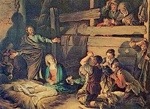A prayer from The Valley of Vision. . . ponder it and may it bless you as you celebrate the birth of the Savior. .
O Source of all Good,
What shall I render to Thee for the gift of gifts,
Thine own dear Son, begotten, not created,
my Redeemer, Proxy, Surety, Substitute,
His self-emptying incomprehensible,
His infinity of love beyond the heart’s grasp.
Herein is wonder of wonders:
He came below to raise me above,
He was born like me that I might become like Him.
Herein is love;
when I cannot rise to Him He draws near on wings of grace,
to raise me to Himself.
Herein is power;
when Deity and humanity were infinitely apart
He united them in indissoluble unity, the uncreated and the created.
Herein is wisdom;
when I was undone, with no will to return to Him,
and no intellect to devise recovery,
He came, God-incarnate, to save me to the uttermost,
as man to die my death,
to shed satisfying blood on my behalf,
to work out a perfect righteousness for me.
O God, take me in spirit to the watchful shepherds,
and enlarge my mind;
let me hear good tidings of great joy,
and hearing, believe, rejoice, praise, adore,
my conscience bathed in an ocean of repose,
my eyes uplifted to a reconciled Father,
place me with ox, ass, camel, goat,
to look with them upon my Redeemer’s face,
and in Him account myself delivered from sin;
let me with Simeon clasp the new-born Child to my heart,
embrace Him with undying faith,
exulting that He is mine and I am His.
In Him Thou hast given me so much that heaven can give no more.

Incarnation. If you understand the word incarnation, you’ll understand what Christmas is about.
Christmas is frankly doctrinal. The invisible has become visible, the incorporeal has become corporeal. In other words, God has become human.
This is not only a specific doctrine, but it’s also unique. Doctrine always distinguishes you. One of the reasons we’re afraid to talk about doctrine is because it distinguishes us from others.
Here’s why the doctrine of Christmas is unique. On one hand, you’ve got religions that say God is so immanent in all things that incarnation is normal. If you’re a Buddhist or Hindu, God is immanent in everything. On the other hand, religions like Islam and Judaism say God is so transcendent over all things that incarnation is impossible.
But Christianity is unique. It doesn’t say incarnation is normal, but it doesn’t say it’s impossible. It says God is so immanent that it is possible, but He is so transcendent that the incarnation of God in the person of Jesus Christ is a history-altering, life-transforming, paradigm-shattering event.
Dorothy Sayers

D.Sayers
It is not true at all that dogma is ‘hopelessly irrelevant’ to the life and thought of the average man. What is true is that ministers of the Christian religion often assert that it is, present it for consideration as though it were, and, in fact, by their faulty exposition of it make it so. The central dogma of the Incarnation is that by which relevance stands or falls. If Christ was only man, then He is entirely irrelevant to any thought about God; if He is only God, then He is entirely irrelevant to any experience of human life. It is, in the strictest sense, necessary to the salvation of relevance that a man should believe rightly the Incarnation of our Lord Jesus Christ. Unless he believes rightly, there is not the faintest reason why he should believe at all. And in that case, it is wholly irrelevant to chatter about ‘Christian principles.’
On Christmas Eve at 6:30pm we’ll worship this King and revel in his incarnation.
Immensity cloistered in thy dear womb,
Now leaves His well-belov’d imprisonment,
There He hath made Himself to His intent
Weak enough, now into the world to come;
But O, for thee, for Him, hath the inn no room?
Yet lay Him in this stall, and from the Orient,
Stars and wise men will travel to prevent
The effect of Herod’s jealous general doom.
Seest thou, my soul, with thy faith’s eyes, how He
Which fills all place, yet none holds Him, doth lie?
Was not His pity towards thee wondrous high,
That would have need to be pitied by thee?
Kiss Him, and with Him into Egypt go,
With His kind mother, who partakes thy woe.
–John Donne, Nativity from La Corona (1610)
There’s more info on this poem:
—to see the entire larger poem of which this is an excerpt (the italicized first and last lines give us a hint)
— brief commentary at Harper’s
About This Blog
This blog is one of the primary ways that Christ Community's staff can connect and share information. Look for important updates on our community life here each week.
Visit the CCC Website.
View our Church Calendar.
Reminders & Reflections
Blog Archive
- June 2015
- May 2015
- April 2015
- March 2015
- February 2015
- January 2015
- December 2014
- November 2014
- October 2014
- September 2014
- August 2014
- July 2014
- June 2014
- May 2014
- April 2014
- March 2014
- February 2014
- January 2014
- December 2013
- November 2013
- October 2013
- September 2013
- August 2013
- July 2013
- June 2013
- May 2013
- April 2013
- March 2013
- February 2013
- January 2013
- December 2012
- November 2012
- October 2012
- September 2012
- August 2012
- July 2012
- June 2012
- May 2012
- April 2012
- March 2012
- February 2012
- January 2012
- December 2011
- November 2011
- October 2011
- September 2011
- August 2011
- July 2011
- June 2011
- May 2011



